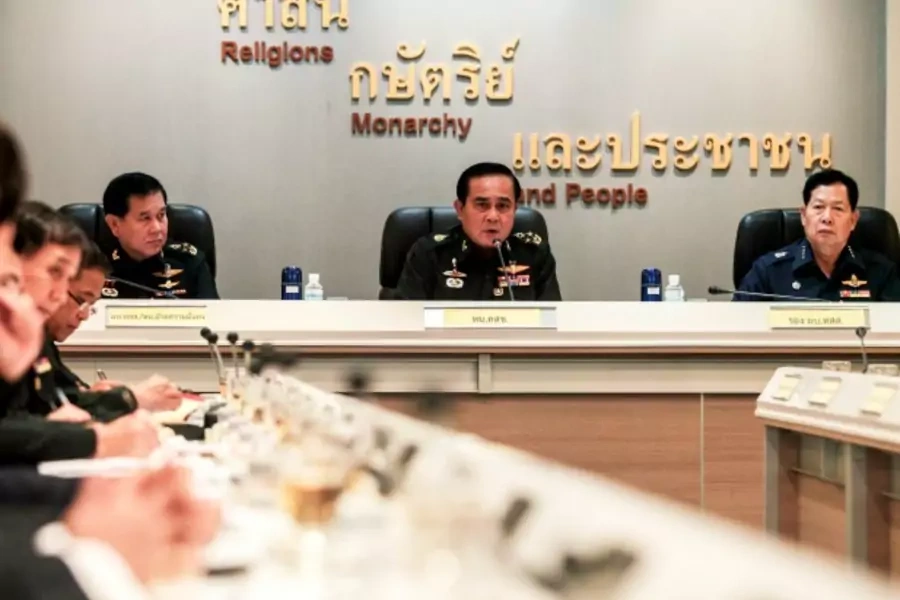More on:
Over the weekend, Thailand’s junta leader, Prayuth Chan-ocha, announced a firmer roadmap toward civilian rule than the army had previously revealed. Prayuth went on Thai television and announced that a drafting committee will write a new permanent constitution, to replace the 2007 version the army junked in its May coup. The committee will finish drafting by the middle of next year, Prayuth announced, and then by the fall of 2015, Thailand can hold national elections again. In the meantime, Thailand will operate under an interim constitution that the junta draws up. The junta will pick some civilian ministers to help run the country.
Although allowing some non-military men and women to help run one of the biggest economies in Asia is at least a small step forward—some Thai businesspeople had feared that Prayuth and the army believed they themselves could run all the ministries, as if it were 1960 again—Prayuth’s timeframe left a lot of questions unanswered. No one is going to ask Prayuth these questions, since criticism of the junta is officially banned in Thailand. But a few questions left unanswered include:
- Will the Thai public have a chance to vote on the new constitution, in a referendum like the one that was held on the 2007 constitution? Don’t count on it. Prayuth did not mention such a referendum in his televised speech, and the army knows that the majority of rural Thais, unhappy about the coup, likely would vote down the new constitution, which almost surely will be drafted by conservative, royalist, army-backed elites. So the constitution most likely will be drafted and then simply put into place with no public referendum at all, a major step backward for Thai politics.
- Will the parliament seated sometime in late 2015 (or maybe even later) be made up of elected MPs? Don’t count on that one either. The new constitution will surely allow for a small number of elected MPs, but it will create new ways for the military and Bangkok elites to install non-elected MPs who can dominate parliament. The army may even reserve a percentage of appointed seats in the new parliament to be named by army leaders, Myanmar-style.
- What will Prayuth do for the next year and a half? Although the junta may put some civilian ministers into place, don’t count on Prayuth relaxing his grip on power. Prayuth will probably make himself prime minister in the interim government, even though the junta says publicly that it will only oversee the interim ministers. Prayuth also may simultaneously extend his term as army chief rather than handing over power in the army to someone else, even if that person is a trusted lieutenant.
- What will Prayuth do after the next year and a half? Publicly, the junta continues to portray its coup as a necessary action, and Prayuth as a reluctant leader who only stepped in when there were no other options to resolve Thailand’s political stand-off. (Even if this theory were true, it says a lot about the weakness of Thai institutions that the army could defend a coup as necessary and have the theory bought by many Thais and foreigners.) But news stories indicating that Prayuth had collaborated for a long time prior to the coup with Suthep Thaugsuban, who led the protests that helped topple the Yingluck Shinawatra government, suggest Prayuth hardly acted on the spur of the moment in May. Though he does not have a good political ear, and though he hates speaking to the media, Prayuth also clearly believes that he is Thailand’s savior. Giving up that role may not prove so easy, in Prayuth’s mind. It is certainly possible that, even after the constitution is drafted and elections are held, Prayuth may keep himself as the power behind the government, possibly by further extending his term as army chief.
More on:
 Online Store
Online Store

